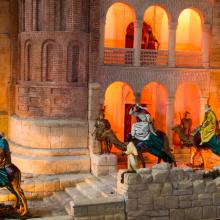wise men
Jan. 6: The Feast of the Epiphany. The day that marks the revelation of God’s incarnation in Jesus Christ. It was an important day in my family growing up. On “King’s Day,'' in Puerto Rican custom, children would go to the fields and pick grass to leave under their beds. By the next morning, the “Magi” would have already visited — leaving presents in lieu of grass, their camels well-fed from the grass for their journey to the next house.
The Magi finally appeared in nativity scenes over the weekend. Soon, if not already, they’ll be packed and stored away until next year’s Epiphany, which is a shame. These late arrivers are some of the most provocative, prophetic, and polarizing figures in the Christmas story, and we need to learn their lessons and carry them forward.
The wise men decided not to collaborate in facilitating Herod’s raid on the holy family. No doubt God would have found another way to protect Jesus, to ensure that Jesus grew up to accomplish his saving work in the world. But it is significant to acknowledge, especially in our particular moment in time, that God chose to move this salvation story forward through these holy non-collaborators. Somehow the wise men realized, whether by recognizing Herod’s duplicitousness or taking seriously the warning that came to them in a dream, that it would be unjust and unwise to serve as Herod’s enforcers.
In As I Lay Dying, the main character Anse appears self-absorbed when at his wife’s death he says, “God’s will be done. . . . Now I can get them teeth.” His character will certainly not be remembered for altruism. But Anse will be remembered for the physical effects of poverty: feet marred by labor, a spine permanently bent, skin unable to sweat from sunstroke suffered tending the fields, and a mouth without teeth.
To be clear, poverty itself does not cause dental issues. A local dentist reminds me, “Ancient skulls have minimal tooth loss. Rough grains cause more wear. For the most part rich, processed, sugary, and poorly nutritious foods destroy teeth.”
Dentistry may feel far removed from Epiphany: astronomical sighting, magi from the east, and three extravagant gifts. But I wonder, given the knowledge of these precious gifts and their use in that time for dental care, if perhaps that frankincense and myrrh would protect that winsome smile of Christ for the next three decades of his life. With these rich gifts in hand, the trio Mary, Joseph, and Jesus could leave to the safety of Egypt before Herod would threaten the life of Christ and every other young boy under two.



